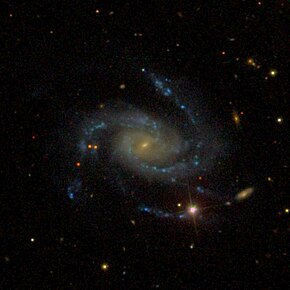NGC 7610 is a spiral galaxy in the constellation Pegasus. Discovered by Andrew Ainslie Common in August 1880, it was accidentally "rediscovered" by him the same month, and later given the designation NGC 7616.[3]
| NGC 7610 | |
|---|---|
 SDSS image of NGC 7610 | |
| Observation data (J2000 epoch) | |
| Constellation | Pegasus |
| Right ascension | 23h 19m 41.4s[1] |
| Declination | +10° 11′ 06″[1] |
| Heliocentric radial velocity | 3554 km/s[1] |
| Distance | 160 Mly[2] |
| Apparent magnitude (V) | +13.44[1] |
| Characteristics | |
| Type | Scd[1] |
| Apparent size (V) | 2.5′ × 1.9′[1] |
| Other designations | |
| UGC 12511, PGC 071087,[1] | |
Supernova
editIn October 2013 SN 2013fs was discovered in NGC 7610. It was detected approximately 3 hours after the light from the explosion reached Earth, and within a few hours optical spectra were obtained - the earliest such observations ever made of a supernova.[2]
References
edit- ^ a b c d e f g "NED results for object NGC 7610". NASA/IPAC Extragalactic Database. Retrieved 17 February 2017.
- ^ a b Perkins, Sid (2017-02-13). "Exploding Star Yields its Secrets". Science. AAAS. Retrieved 15 February 2017.
- ^ Seligman, Courtney. "NGC Objects: NGC 7600 - 7649". Celestial Atlas. Retrieved 17 February 2017.
External links
edit- Media related to NGC 7610 at Wikimedia Commons